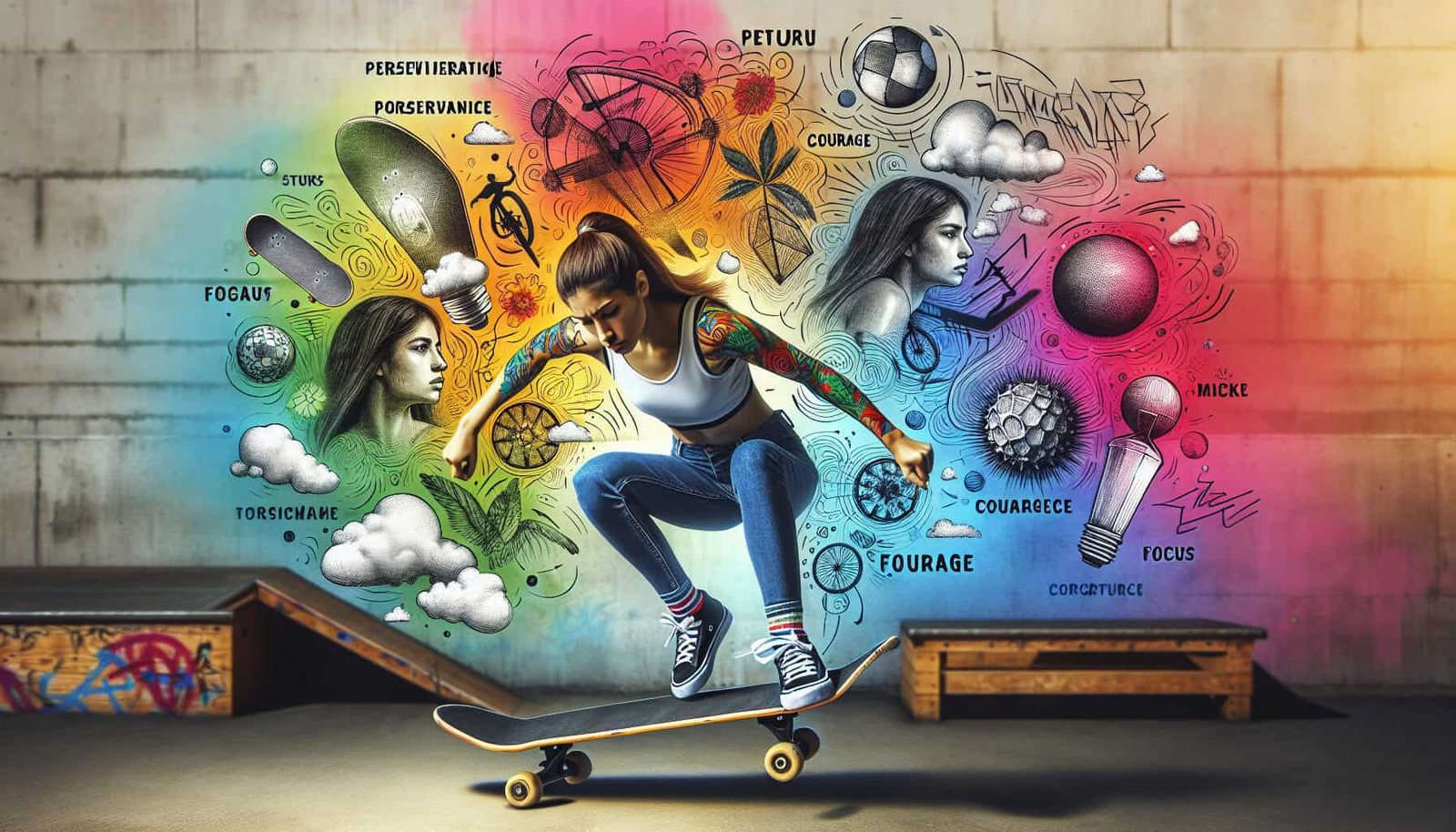Skateboarding is not just a physical sport, it’s also a mental game. As you glide through the streets, attempting tricks and conquering new obstacles, there is a lot going on in your mind. From the fear of falling to the pressure of performing well, staying focused while skateboarding requires a solid mental approach. In this article, we will explore strategies to help you handle the mental aspects of skateboarding and keep your mind in the game. So, whether you’re a seasoned skater or just starting out, buckle up and get ready to conquer the mental challenges of skateboarding!
Setting Clear Goals
Defining Your Objectives
When it comes to skateboarding, setting clear goals is essential for both progress and mental well-being. Start by defining what you want to achieve as a skater. Do you want to master a specific trick? Compete in a tournament? Improve your overall skills? Clearly articulating your objectives will help you stay focused and motivated throughout your skating journey.
Breaking Goals into Achievable Steps
Once you have defined your objectives, it’s important to break them down into smaller, more achievable steps. This not only makes your goals seem less overwhelming but also provides a clear roadmap for your progress. For example, if your goal is to learn a new trick, start by breaking it down into smaller components and practice each part individually. By taking things one step at a time, you’ll steadily build confidence and skill.
Building Mental Resilience
Recognizing and Overcoming Fear
Fear is a natural part of skateboarding, especially when attempting new tricks or pushing your limits. However, it’s important to recognize that fear can hold you back from reaching your full potential. To overcome fear, it’s crucial to confront it head-on and gradually push your comfort zone. Start by visualizing success, imagining yourself landing the trick or maneuver smoothly. Then, take small steps towards your goal, gradually increasing the difficulty. Remember, fear is only temporary, and with practice, you’ll build mental resilience.
Developing Confidence
Confidence is key to excelling in skateboarding. One effective way to boost your confidence is by consistently practicing and mastering the fundamentals. As you improve your skills and become more comfortable on your skateboard, your confidence will naturally grow. Additionally, surround yourself with a supportive skateboarding community. Skating with others who share your passion will not only provide encouragement but also inspire you to push your limits.
Accepting Failure as Part of the Process
Failure is an inevitable part of learning and growing as a skater. It’s important to embrace failure as a valuable opportunity for growth and improvement. When you fall or miss a trick, don’t let it discourage you. Instead, use it as a learning experience. Analyze what went wrong, adjust your technique, and try again. Remember, even the most skilled skateboarders have faced countless failures along their journey, but they persisted and eventually succeeded.

Creating a Positive Mindset
Practicing Mindfulness
Mindfulness is the practice of being fully present and aware of your thoughts and feelings in the current moment. Incorporating mindfulness into your skateboarding routine can significantly improve your mental state. Before each session, take a few moments to clear your mind and focus on your breath. By becoming more mindful, you’ll be able to fully immerse yourself in the present skateboarding experience, enhancing your overall enjoyment and mental well-being.
Visualizing Success
The power of visualization should not be underestimated. In skateboarding, visualization involves mentally rehearsing a trick or maneuver before physically attempting it. Close your eyes, picture yourself successfully landing the trick, and imagine the feeling of accomplishment. By repeatedly visualizing success, you’ll reinforce positive neural pathways in your brain, making it easier to execute the trick when you actually try it.
Using Affirmations
Affirmations are positive statements that help shift your mindset and boost your confidence. Incorporate affirmations into your skateboarding routine by repeating empowering statements to yourself, such as “I am capable of achieving my goals” or “I have the skills to overcome any challenge.” By consistently affirming your abilities, you’ll cultivate a positive mindset that will support you in achieving success on your skateboard.
Managing Distractions
Identifying and Eliminating Distractions
Skateboarding requires focus and concentration, so it’s crucial to identify and eliminate distractions that can hinder your performance. Common distractions may include external noises, negative thoughts, or even your own self-doubt. Create a skateboarding environment that minimizes distractions by choosing quiet locations or wearing noise-canceling headphones. Additionally, practice mindfulness techniques to redirect your attention back to your skating whenever distractions arise.
Maintaining Focus in High-Pressure Situations
In high-pressure situations, such as competitions or challenging skate spots, it’s easy to lose focus and let nerves get the best of you. To maintain focus, develop a pre-session routine that helps you get into the right mindset. This can include deep breathing exercises, stretching, or listening to motivational music. Remember to stay in the present moment and trust in your abilities. By staying focused, you’ll be better able to execute tricks and overcome any obstacles.

Maintaining Motivation
Finding Inspiration
Skateboarding requires consistent motivation to push through challenges and continue progressing. Find inspiration from professional skateboarders, skateboarding videos, or even your own skateboarding idols. Surround yourself with positive influences that ignite your passion for skateboarding and remind you of what’s possible. Watching others achieve greatness can fuel your own motivation and encourage you to strive for your goals.
Setting Rewards
Rewarding yourself for reaching milestones and goals is an effective way to sustain motivation. Set small rewards for yourself, such as treating yourself to a new skateboard accessory or indulging in your favorite meal after accomplishing a specific objective. These rewards serve as tangible reminders of your progress and can help keep your motivation levels high.
Trying New Tricks and Challenges
Skateboarding is all about pushing boundaries and trying new things. When you find yourself in a rut or lacking motivation, spice things up by setting new challenges or learning new tricks. Experiment with different styles of skating, explore new skate spots, or simply try a trick you’ve always wanted to learn. By embracing new experiences, you’ll reignite your passion for skateboarding and find renewed motivation along the way.
Developing Mental Discipline
Maintaining a Regular Training Routine
Consistency is key in skateboarding. Establishing a regular training routine not only helps improve your physical skills but also strengthens your mental discipline. Set aside dedicated practice time each day or week and stick to your schedule. By committing to consistent practice, you’ll develop a strong work ethic, allowing you to progress steadily and reach your goals.
Pushing Through Mental Barriers
Skateboarding is as much a mental challenge as it is a physical one. From fear to self-doubt, there are various mental barriers that can hold you back. However, it’s essential to push through these barriers and continue pushing your limits. Recognize that self-doubt is normal but doesn’t define your abilities. Take gradual steps outside your comfort zone, challenge negative thoughts, and celebrate small victories. With each mental barrier you overcome, you’ll grow stronger and more confident in your skateboarding journey.

Managing Performance Anxiety
Utilizing Relaxation Techniques
Performance anxiety can negatively impact your skateboarding abilities. One effective way to manage anxiety is by incorporating relaxation techniques into your routine. Deep breathing exercises, progressive muscle relaxation, or even listening to calming music can help calm nerves and center your focus. Practice these techniques before and during high-pressure situations to reduce anxiety and perform at your best.
Using Breathing Exercises
Breathing exercises are a simple yet powerful tool to manage both physical and mental stress. When faced with a nerve-wracking skateboarding moment, focus on your breath. Take slow, deep breaths, inhaling through your nose and exhaling through your mouth. This intentional focus on your breath helps regulate your heart rate, promote relaxation, and reduce anxiety. Incorporate breathing exercises into your skateboarding routine and witness the positive impact on your performance.
Seeking Support from Peers or Professionals
Sometimes, managing performance anxiety requires seeking support from others. Reach out to fellow skaters who have experienced similar challenges and share your thoughts and concerns. They can provide valuable advice, reassurance, and perspective. Additionally, consider working with a sports psychologist who specializes in skateboarding or seeking guidance from a trusted coach or mentor. These professionals can offer tailored strategies to help you overcome performance anxiety and enhance your overall mental well-being.
Seeking Professional Help
Understanding the Role of Sports Psychologists
Sports psychologists play a crucial role in enhancing an athlete’s mental performance. They specialize in helping individuals improve their psychological well-being, focus, and overall mindset. In the context of skateboarding, a sports psychologist can offer specific techniques and strategies to build mental resilience, manage performance anxiety, and optimize performance. If you find yourself consistently struggling with the mental aspects of skateboarding, consider seeking the guidance of a sports psychologist to unlock your full potential.
Working with a Coach or Mentor
A coach or mentor can provide invaluable support and guidance in your skateboarding journey. They can help identify areas for improvement, provide constructive feedback, and offer personalized advice tailored to your specific needs. Through regular check-ins, drills, and structured training sessions, a coach or mentor can help you develop a stronger mental game and overcome any hurdles you may encounter. Don’t underestimate the positive impact that working with a knowledgeable and experienced individual can have on your skateboarding progression.

Building a Support Network
Connecting with Like-minded Skaters
Building a support network of like-minded skaters is vital for your mental well-being in skateboarding. Surround yourself with individuals who share your passion, understand your struggles, and can provide encouragement and motivation. Connect with local skateboarding communities, attend skateboarding events, or join online forums to meet fellow skaters. By surrounding yourself with positive influences, you’ll have a support system to lean on during challenging times and celebrate your successes together.
Receiving Support from Friends and Family
While skateboarding may be an individual sport, the support of your friends and family is invaluable. Share your skateboarding journey with your loved ones, expressing your goals, challenges, and successes. Seek their encouragement and listen to their advice. Their unwavering support will boost your motivation, uplift your spirits during obstacles, and celebrate your achievements with genuine pride. Remember, having a solid support system outside of skateboarding can play a significant role in your overall mental and emotional well-being.
Balance and Self-care
Prioritizing Rest and Recovery
In the fast-paced world of skateboarding, it’s easy to neglect rest and recovery. However, giving your mind and body time to rest is essential for optimal performance and mental well-being. Incorporate rest days into your training schedule to prevent burnout and allow your muscles to recover. Use these rest days to relax, engage in other hobbies, or spend time with loved ones. By prioritizing rest, you’ll come back to skateboarding with renewed energy and a fresh perspective.
Maintaining a Healthy Lifestyle
A healthy lifestyle directly impacts your mental and physical well-being in skateboarding. Ensure you’re fueling your body with nutritious meals, staying hydrated, and getting enough sleep. Proper nutrition, hydration, and rest contribute to enhanced mental clarity, focus, and overall performance. Incorporate regular exercise outside of skateboarding to improve your physical fitness and boost your mental well-being. Remember, your mind and body are interconnected, and taking care of both is crucial for long-term success in skateboarding.
In conclusion, skateboarding is not just about physical skills; it also heavily relies on mental strength and well-being. By setting clear goals, building mental resilience, creating a positive mindset, managing distractions, maintaining motivation, developing mental discipline, managing performance anxiety, seeking professional help, building a support network, and prioritizing balance and self-care, you can effectively handle the mental aspects of skateboarding and stay focused. Embrace the mental journey as an integral part of your skateboarding experience and enjoy the progress and personal growth that comes with it.


